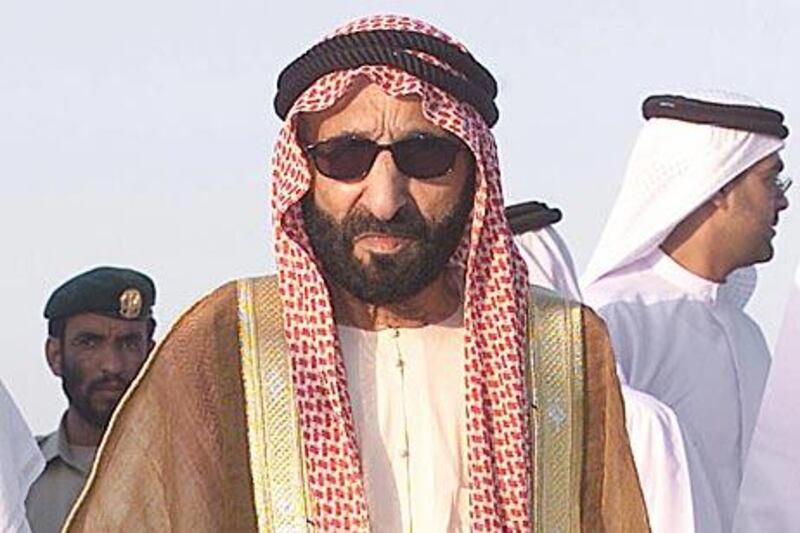Officials and members of the Federal Nation Council from Ras al Khaimah spoke yesterday of their sorrow at Sheikh Saqr's death, a leader whose passage marks the end of the era of the federation's founders.
Some constant threads emerged from their stories: they describe a father figure who was crucial to educating his citizens while striving to build a more stable and secure Ras al Khaimah.
"Sheikh Saqr was one of the founders of the Union," said Yousef al Neaimi, an FNC member from RAK and the chairman of the RAK Chamber of Commerce and Industry. "Now this is the last founder of this federal umbrella. With his loss, we lost all the founders, who were led by Sheikh Zayed and Sheikh Rashid. It definitely has a strong impact, not only on the children of Ras al Khaimah but of all of the children of the UAE.
"Sheikh Saqr for us was a father before being the ruler," he said. "He was for us an example in all our work. He supported the sons of the emirate, the federation, and education was his number one priority."
That support was extended to those who studied in the emirate and those who went abroad, to countries such as Egypt, Kuwait and Qatar. "This whole generation that graduated from college when the federation was forming, it was a result of the support they found from Sheikh Saqr, may God have mercy on him."
The legacy he left includes all the development of modern Ras al Khaimah, despite having to deal with a lack of resources. "Everything going on in Ras al Khaimah, from development, construction, education, and health, is all thanks to Sheikh Saqr," he said.
But his most important legacy is the union.
"Sheikh Saqr was one of the most important supporters of the union, and he always insisted that the federation should be the fruit that can be enjoyed by the sons of the UAE after this generation of greats who created this federation," said Mr al Neaimi.
Political statesmanship is one of his main characteristics, said Ahmed al Khateri, another RAK member, and the head of the emirate's Judicial Department.
"Before the union, Sheikh Saqr had an important role in dealing with the Trucial States, and he chaired the first meeting of the Trucial State Council that included Qatar and Bahrain in the 1960s," he said.
But his work was also crucial in maintaining the internal stability and security of the emirate.
"It gave him a practical viewpoint of the UAE, since he lived through the UAE's progress. RAK has a tribal system, with a large variety of tribes, and Sheikh Saqr was able to contain this group with varied opinions and thinking, including Bedouins and the Shehhi tribe," said Rashid al Shuraiqi, an FNC member from RAK and the director general of the Abu Dhabi Food Control Authority.
"He was able to create harmony among the group and dedicate their energy towards serving the emirate and the UAE."
There was also much reminiscing about Sheikh Saqr's fatherly approach to his people. Mr al Khateri's relationship with Sheikh Saqr goes back 20 years."He took charge of me, and directly supervised my studies, and then my work in the Ras al Khaimah judicial department," said Mr al Khateri, whose grandfather was a personal aide to Sheikh Saqr.
"He gave me important responsibilities early on, appointing me as a judge and then to the judicial department, and I have so much respect and my heart is almost broken at losing him," he said.
"His most important achievement is education after he became ruler, and at the time there were limited resources and cash, but it did not prevent him from focusing on education and trying to attract Arab expertise from Egypt, Kuwait and Qatar and supporting education in RAK and sending the sons of RAK abroad for education."
This focus on education "was reflected positively on the society", said Mr al Shuraiqi.
"He would check every day personally to see if people were going to school. There are top officials today in big government departments in RAK and federally that Sheikh Saqr personally sent someone to take them to school if they missed one day," he said.
Nidal al Tunaiji, a member of the FNC from RAK, said Sheikh Saqr pioneered the idea that "the woman should be a partner of man in work and service" in Ras al Khaimah.
"He was a man of science who encouraged his sons and daughters to seek education, and he was one of the supporters of providing education to his people because he believed it is the pillar of human development," she said.
But Ms al Tunaiji also remembers Sheikh Saqr's softer, fatherly side. "I believe that nobody in the emirate has not met the Sheikh, a meeting of a father with his children," she said, adding that the closeness of the people to its leaders is one of the country's greatest virtues.
He even saw the union as his child, she said. "The union is the child of the founders, and they worked on strengthening it, and today the union is self-sufficient and standing up on its own."







